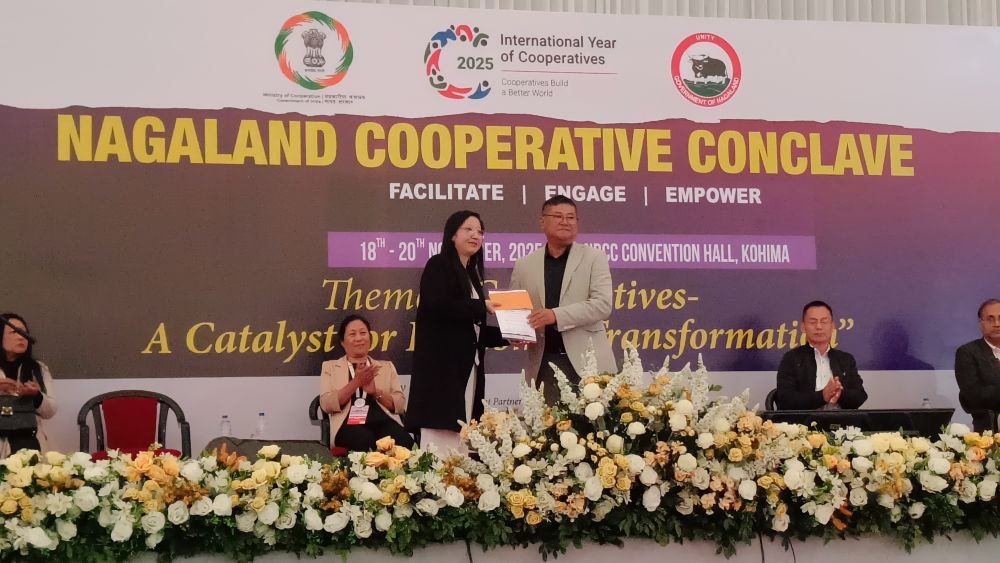Best Stall Award in the Fruit and Food Processing Category being presented to Cold Mountain Food Processing & Marketing C.SLtd., Burma Camp, Dimapur during the valedictory Programme of the three-day Nagaland Cooperative Conclave at NBCC Convention Hall Kohima on November 20.

Morung Express News
Kohima | November 20
With opportunities expanding across agriculture, horticulture, livestock, fisheries, and especially natural farming, Bokato Hesso, Joint Registrar of Cooperative Societies (RCS), underscored that cooperatives “offer a powerful pathway for addressing many of our long-standing challenges.”
Delivering the ‘Evaluation & Way Forward’ address during the valedictory programme of the three-day Nagaland Cooperative Conclave held at NBCC Hall, Kohima, he noted that these challenges cannot be solved by individual farmers alone but require a cooperative business model that embodies democracy, equity, and local ownership.
"No single entity, no matter how powerful, can solve our complex challenges alone,” Hesso stated, stressing the urgent need for cross-sectoral collaborations.
Misalignment & Information Asymmetry
He highlighted that different government departments hold various resources and inputs that can provide policy leverage, and emphasised that “the way forward is to consciously and strategically build bridges between these sectors.”
Further noting that the path of convergence is often littered with bottlenecks, with various sectors speaking distinct languages, holding diverse priorities, and operating under separate rules, he highlighted that some of these obstacles stem from silos, where government departments work in isolation, resulting in duplicated efforts or contradictory policies.
In this context, he also addressed ‘Project Misalignment,’ where policies are not designed to include cooperative societies or create a conducive environment for group participation.
Another major bottleneck is “Information Asymmetry,” he added, elaborating that “Cooperatives on the ground are often unaware of supportive schemes, while policymakers remain unaware of the challenges faced at the grassroots level.”
Hesso further pointed out that a “Weak Institutional Structure” is a major impediment to the growth of cooperatives, compounded by poor management, lack of accountability, limited shareholder participation, and a reluctance to embrace innovation.
Cooperatives as launchpad for young entrepreneurs
Stating that cooperative societies can serve as an effective platform for convergence, he underlined that “this will ensure continuity of programs even beyond the project period.”
Convergence through cooperatives ensures better maintenance of assets and infrastructure, creating a lasting impact, he maintained.
As cooperatives have better access to credit and financial institutions, the RCS Joint Registrar also stressed that bodies like NABARD and NCDC should prioritise financial literacy and the strengthening of cooperative institutions, rather than focusing solely on credit delivery.
He explained that policy harmonisation can be achieved by appointing Nodal Officers to improve coordination among line departments.
Hesso also highlighted the urgent need for information and data sharing to enhance knowledge exchange and better resource utilisation.
With emerging opportunities in agri-startups, climate-resilient farming, processing, logistics, and digital agriculture, he emphasised that cooperatives should serve as a platform for young entrepreneurs to innovate and lead, while actively mobilizing youth into the cooperative movement.
The ‘Way Forward’ requires a collective effort, beginning with recognizing the transformative potential of the cooperative model and forging a collaborative path toward a prosperous, equitable, and sustainable for all, he added.
Engines of empowerment and inclusive growth
In his address, Orenthung Lotha, Commissioner & Secretary for Cooperation & IPR, remarked that the Conclave reinforced the idea that cooperatives are not merely institutions but engines of empowerment, resilience, and inclusive growth.
The discussions and activities at the Conclave have demonstrated how collective community action can drive markets, enhance livelihoods, and shape the economic future of not just Nagaland, but the entire nation, he held.
Under the theme ‘Cooperatives are catalysts for economic transformation,’ Lotha noted that the Conclave brought their vision to life through insight and commitment.
It aimed not just to inform, but to inspire a renewed belief in the potential of Nagaland’s cooperative movement, he added.
Towards this end, Lotha urged the gathering to carry forward the energy, unity and determination they have learned and embraced over the past three days.
He expressed hope that the partnerships formed at the Conclave would continue to benefit farmers, artisans, entrepreneurs, youth, and communities, and encouraged moving forward with confidence and a shared vision.
During the valedictory programme, the Best Stall Award in the Fruit and Food Processing category went to Cold Mountain Food Processing & Marketing CS Ltd, Burma Camp, Dimapur.
United Shemong Farming CS Ltd, Pongo Village, Longleng, received the award in the Weaving, Handicraft, and Artisans category, while Verhiyinumi Khel Agri CS Ltd & Allied CS Ltd, Yoruba Village, Phek, were recognised in the Agri & Allied category.






